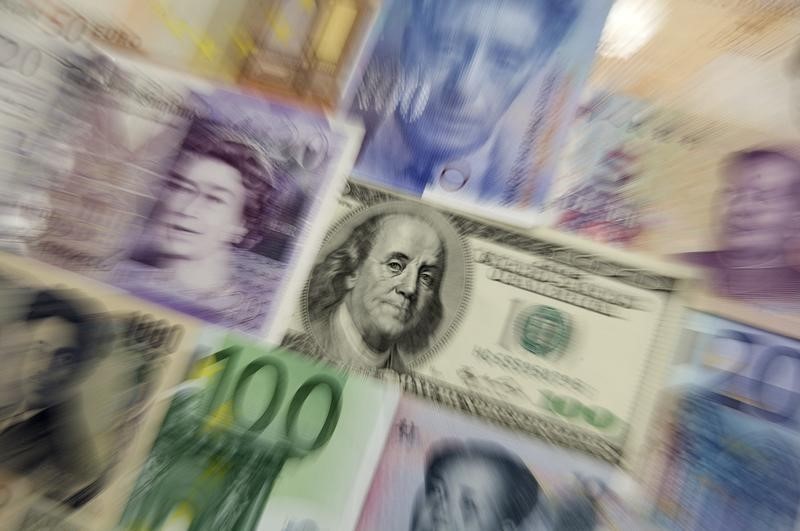(Repeats latest Thursday Forex report after Feb 27 report wascorrected)
* Euro hits 5-week low vs dollar, 6-month trough vs yen
* Benign euro zone inflation curbs ECB rate expectations
* Pound hit by renewed Brexit worries
* Yen supported after BOJ operation, risk aversion,repatriation
* Aussie falls to 2-month low after data disappoints
By Hideyuki Sano
TOKYO, March 1 (Reuters) - The dollar held firm on Thursday,drawing support after the Federal Reserve's new chief JeromePowell struck an optimistic tone on the U.S. economy in a boostto rate hawks that sent global stocks tumbling.
In contrast, benign inflation data in the euro zone dentedexpectations that the European Central Bank will dial back itsstimulus, slamming the euro to five-week lows against the dollarand a six-month nadir against the yen.
The dollar index rose to a five-week high of 90.746, asPowell's optimism on the U.S. economy suggested the Fed is goingto raise interest rates four times this year, one more than whatmarkets had expected.
On the other hand, ECB president Mario Draghi said on Mondayslack in the euro zone economy may be bigger than previouslyestimated. was more hawkish than anticipated. In addition,Draghi wasn't that aggressive when he spoke earlier this week,so there is a clear contrast, said Bart Wakabayashi, TokyoBranch Manager at State Street.
The euro dropped to $1.21835 EUR=EBS , its lowest sinceJan. 18. Against the yen, the single currency fell to 129.86 yen EURJPY= , its weakest since early September and down 5.6percent from its 2-1/2-year high hit just a month ago.
Euro zone inflation slowed to a 14-month low in February,data showed on Wednesday, underscoring why the ECB remainscautious about removing stimulus despite growth exceedingexpectations. in the 19 countries sharing the euro slowed to 1.2percent from 1.3 percent in January, in line with expectationsbut far from the ECB's long elusive target of almost 2 percent.
"Markets are pricing in the chance that the ECB will raiseinterest rates as early as by the end of this year, so a returnof a scenario of another extension in its bond buying andpushing back a rate hike into 2019 could put pressure on theeuro," Makoto Noji, senior strategist at Nikko SMBC said inreport.
The euro was also hurt by political uncertainties as Italians are preparing to vote in a national election on Sunday,while the leading political parties in Germany decide on acoalition deal that would secure Angela Merkel a fourth term aschancellor.
The British pound was pressured by renewed worries overBrexit after British Prime Minister Theresa May said the EU'sdraft legal text published on Wednesday would undermine Britainand threaten its constitutional integrity. pound fell to $1.3743 GBP=D4 , its lowest level sincemid-January. The euro firmed to 0.88625 pound EURGBP=D4 ,having risen almost 1 percent from this week's low of 0.8772touched on Monday.
Still, some say the dollar could falter again given that anysupport for the currency from higher interest rates - the maindriver of its gains until early 2017 - has been tenuous.
In fact, the dollar index fell almost 10 percent last year,the biggest fall in more than a decade even though no othermajor central banks raised interest rates other than the Fed,which not only hiked rates three times but also started trimmingdown its balance sheet.
The dollar index is still down 1.5 percent this year, doggedby suspicions that the Trump Administration prefers a weakerdollar to mend its bulging trade deficit, and worries its bigtax cuts and spending plans may boost fiscal deficits to anextent that they undermine confidence in U.S. debt.
The yen eased about 0.1 percent in Asia on Thursday to106.80 per dollar JPY= , still maintaining slim gains for theweek.
On top of safety bids stemming from wobbly share prices, theyen also got a boost from the previous day's Bank of Japanbond-buying operations, where the central bank trimmed theamount of its buying in super-long Japanese government bonds. of funds by corporates ahead of Japan'sfinancial year-end on March 31 also rendered additional help.
The Australian dollar hit a two-month trough versus thedollar and a nine-month low versus the yen after data onAustralian business investment showed a 0.2 percent dip for theDecember quarter, missing forecasts for a 0.9 percent increase.
The Australian dollar traded 0.5 percent down at $0.7726,having briefly fallen to as low as $0.7717 AUD=D4 .
"The Aussie looked bearish after it had fallen below its200-day moving average and the weak data triggered renewedweakness," State Street's Wakabayashi said.
"With Australian bond yields no longer higher than U.S.bonds, it no longer has the attraction it used to have for along time. I'm quite bearish on the currency," he added.
The U.S. 10-year yield US10YT=RR surpassed the 10-yearAustralian bond yield AU10YT=RR late last month. (Editing by Shri Navaratnam and Jacqueline Wong)
